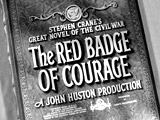
|
The Red Badge of Courage (1951)
In director John Huston's historical epic and 'coming-of-age'
tale faithfully based upon Stephen Crane's 1894 Civil War novel -
it told about a young 'green' private recruit fighting for the northern
Union forces, with intensely realistic battle sequences and a constant
voice-over Narrator (James Whitmore) with the poetic words from the
novel's text:
- the film's prologue about Stephen Crane's book and
the theme of the novel, by the voice-over Narrator: "His story
is of a boy who, frightened, went into a battle and came out of
it a man with courage. More than that, it is a story of many frightened
boys who went into a great Civil War and came out as a nation of
united, strong and free men"
- in September of 1862, on the eve of battle, youthful
recruit Henry Fleming (Audie Murphy) in the Union Army's 304th Regiment
of Volunteers heard troubling rumors of an impending attack of the
Rebel forces, and the Narrator noted that Henry was worried he would
flee the battlefield in fear rather than be courageous:
"There was a youthful private who was deeply troubled by the talk
of his comrades. They were so sure of their courage...So they were
at last going to fight. Tomorrow, perhaps, there would be a battle
and he would be in it. Was it possible that he would be a part of a
great battle in a great war? In the darkness, he saw visions of a thousand-tongued
fear who would babble at his back, and cause him to flee"
|
Henry Fleming (Audie Murphy)
|
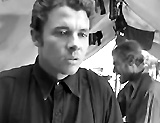
|
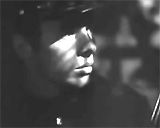
|
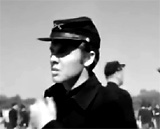
|
|
Worried About His Courage
|
As a Sentry Warned in the Moonlight
|
Impatient about Fighting
|
- in the moonlight while on sentry patrol that evening,
Henry was confronted (in the distance) by a Reb voice across the
river who ominously warned for him to get out of view to avoid
being shot and injured (to acquire a 'red badge'): ("Don't
go getting one of them little red badges pinned on you");
the next day, Henry groused about more regimental drilling and
was impatient to begin fighting: ("Thunder, I joined up to
fight! I want to smell gun smoke for once. What are these guns
for, anyway, to shoot or to drill with? Might as well be broomsticks")
- when orders arrived to finally march to battle: ("Grab
your knapsacks! We're marching!"), the Narrator described Henry's
increasing doubts: "He felt alone in space. No one else seemed
to be wrestling with such a terrific personal problem. He was a mental
outcast"; he left the troops during their march to war to be
by himself under a tree; a confident recruit named Loud Soldier/Tom
Wilson (Bill Maudlin) (who described him as "getting blue" and "looking
thundering peaked") joined Henry, who was uncertain about his
courage and asked: "How do you know you won't run when the time
comes?"; Wilson answered assuredly: "The man that bets
on my running is going to lose his money, that's all"
- in the first scene of actual battle, after the Union
forces set up a battle line at the edge of an open field, Wilson
rushed to Henry and asked him to deliver his pocket watch to his
parents if he was to die: ("Something tells me it's my first
and last battle. I'm a gone goose. I just know it. I want you to
send this to my folks. They gave it to me last year when I turned
21")
- one of the Union officers back behind the line of
fighting (and on horseback) was swinging his sword while ordering
a suicide charge by the ground troops - he called his men cowards
as they were retreating: ("Go back, you cowards! Get back in
there and fight!")
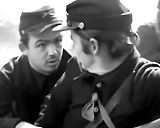
|
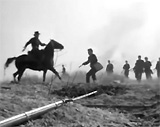
|
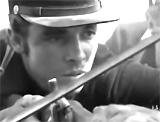
|
|
Fearing He Would Die, Wilson Gave Henry His Pocket
Watch
|
Union Officer Calling His Men Cowards
|
Henry In the Heat of Battle
|
- after the first wave of a Rebel attack (with some
casualties) followed by their retreat, the Union soldiers discussed
their reactions to seeing a man killed in their midst: ("The
men look much bigger through the powder smoke. Bayonets as thick
as a spiked iron fence. I was so scared, my feet was froze . I
never seen a man killed before. Lost a pile of men, they did. We
lost some too!"); the narrator described Henry's reaction:
("So it was all over at last. The supreme trial had been passed.
The red, formidable difficulties of war had been vanquished. He
felt that he was a fine fellow. He saw himself even, with those
ideals which he had considered as far beyond him")
- when the fierce Rebel attack resumed a second time,
the Narrator spoke: ("The youth stared. Surely, he thought,
this impossible thing was not about to happen. He waited as if he
expected the enemy to suddenly stop, apologize, and retire bowing");
Henry fled in retreat as fast as he could run; in the woods to his
surprise, he overheard Union officers proclaiming victory: ("We've
held them, General!") and then he felt pangs of guilt for betraying
his comrades: (Narrator: "The youth cringed, as if discovered
in a crime. So his regiment had won after all. His imbecile comrades
had remained. And their very ignorance had brought them victory.
He felt betrayed. He wondered what they would remark, when later
he appeared in camp. His mind heard howls of derision")
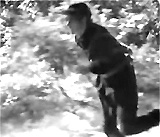
|
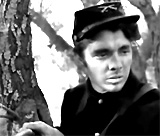
|
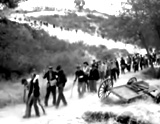
|
|
With a New Charge, The Cowardly Henry Fled on
Foot
|
Henry's Pangs of Guilt
|
The Victorious Yet Ragged Regiment That Henry
Had Deserted
|
- the sequence of Henry's return to his wounded regiment,
that was limping down a hillside: (Narrator: "He regarded
the wounded soldiers in an envious way. He conceived persons with
torn bodies to be peculiarly happy. He wished that he, too, had
a wound. A red badge of courage"); one of the group of 'red-badged'
soldiers began to sing 'Glory, Glory Hallelujah'; when asked by
the Tattered Man (Royal Dano):
"Where are you hit, old boy?", Henry didn't respond out
of guilt
- while marching along, seriously wounded, gaunt and
dazed Jim Conklin/The Tall Soldier (John Dierkes) expressed his dying
worries to Henry: ("I'm afraid I'll fall down, and then you
know them darned artillery wagons they're like to run over me");
sensing he was about to expire, he broke from the ranks when wagons
thundered by, ran up a hill, and said to Henry: "Leave me be" before
he fell down dead in a field
- the sequence of Henry, separated from his regiment
(like many others) and being knocked down when he grabbed a retreating
Union soldier, who tussled with him and knocked him in the back of
his head with the butt of his gun; with the serious head injury,
Henry was returned to his regiment that night with assistance from
the garrulous Cheery Soldier (Andy Devine) - Henry told everyone
that his head wound was from a bullet ("I got shot in the head")
and was treated and gladly received back; as he rested that night,
the Narrator described Henry's redemption: ("He had performed
his mistakes in the dark so he was still a man")
- the next day as the regiment proceeded toward the
next battle, Henry bragged to Wilson about his courage the previous
day: ("Why, man, you didn't see none of the fight"); when
the fight commenced, Henry suddenly became bold: "They'd better
watch out. By jiminy, if they keep on hitting at us, well, they just
better watch out, that's all I say!" - and suddenly found himself
jumping up from the trench and advancing toward the enemy on foot:
(Narrator:
"The youth was not conscious that he was erect upon his feet.
He lost every sense but his hate. For the first time in his life, he
was possessed by a great passion: The passion to destroy the enemy.
He felt the power of an army in himself. He was a battle cry, a bullet,
a sword!"); he was called a "wildcat" by the Lieutenant
(Douglas Dick) for his bravery
- just before the upcoming next surge of Rebs in battle,
the General (Tim Durant) (riding on a majestic white horse) personally
encouraged the "mule-drivers" in the 304th Regiment to
fight for him as a kind of pep talk, and invited himself for supper
with three different units after they'd "licked the Rebs" for
a meal of "hardtack and sowbelly"
- a second chance came for Henry to prove his worth
when the Rebs counter-attacked a second time, as Henry encouraged
his fellow soldiers by heroically leading the charge from the front:
("What are you, soldiers or a bunch of mule drivers? Come on!");
when the Union flag bearer was killed, Henry grabbed the flag to
keep it waving, and continued to be at the front of the attack; he
also grabbed the tattered Confederate flag when the standard bearer
(Edwin Breen) of the opposing side was felled, to claim and signify
the Union victory
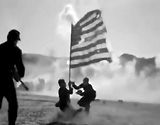
|
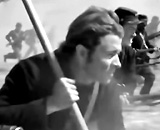
|
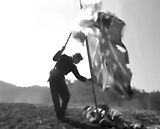
|
|
Henry Grabbing the Union Flag While Leading the
Charge
|
Henry's Heroic Bravery During the Battle
|
Acquiring the Fallen Confederate Flag
|
- after the battle was won, the Union soldiers spoke
casually with the defeated prisoners of the Confederates, one of
whom claimed: "I wish I was dead"
- one of Henry's comrades Thompson (Robert Easton) reported
that the Colonel praised and was impressed by the brave lad who carried
the flag at the forefront of the charge, along with Tom Wilson ("They
deserve to be major generals"); however, Henry felt undeserving,
and was compelled to confess to Tom, in private, that he had run
away from battle earlier: ("Yesterday, when things started getting
hot, I-I was mighty scared...I lit out....Not very far. I was only
scared for a minute, you understand. Just a minute. After that, I
was that ashamed that I couldn't get back in the fight soon enough");
Tom revealed that he had also 'skedaddled' from the fighting: ("I'm
glad you did, Henry, because it makes me feel a sight better. I skedaddled
myself yesterday, when about half the other fellas did. Only, the
Captain caught me and made me stay. Reckon I was more scared of him
than I was of the Rebs"); Henry was relieved: "I guess
confession's good for a fella, Tom. What I mean is, it's good for
the soul"
|
Mutual Confessions of Cowardice
|
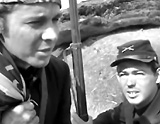
|
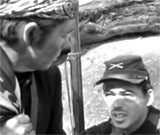
|
|
Henry to Tom
|
Tom to Henry
|
- in the film's conclusion, it appeared that the recent
victory was going to be credited to General Whiterside who had
led another Union Army unit from another flank; the soldiers joined
ranks to begin marching away, mostly thankful that they were still
alive; Bill Porter (Arthur Hunnicutt) quipped about how he was
still in one piece: "I got holes in my cap, holes in my pants,
but there ain't no holes in me except the ones that was intended!";
another Union soldier mused: "You know, it's mighty pretty
country around here. I mean, it would be if they wasn't fighting
battles all over it"; Bill spoke about being home soon for
spring planting: "Reckon we'll be home for spring planting?" Another
soldier added: "Just listen to them birds"; Henry spoke
hopefully too: "They don't take no time to tune up and start
singing. Soon as the shooting stops and the smoke clears, they're
right back at it"
- the Narrator's poetic summary ended the film: "So
it came to pass, that as he trudged from the place of blood and wrath,
his soul changed. He had been to touch the great death and found
that after all, it was but the great death. Scars faded as flowers
and the youth saw that the world was a world for him. He had rid
himself of the red sickness of battle. The sultry nightmare was in
the past. He turned now, with a lover's thirst to images of tranquil
skies, fresh meadows, cool brooks. An existence of soft and eternal
peace"
|
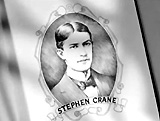
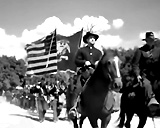
Stephen Crane's 'The Red Badge of Courage': Prologue
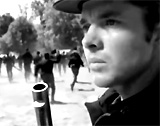
War Announced - Henry's Reaction: "He felt alone
in space..."
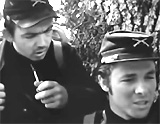
Henry to Tom Wilson/Loud Soldier: "How do you know
you won't run when the time comes?"
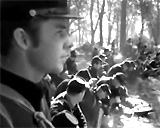
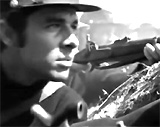
Battle Lines Drawn
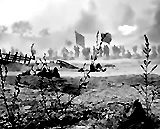
After Their First Charge, Rebels Retreated
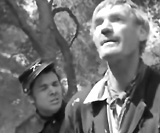
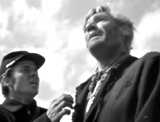
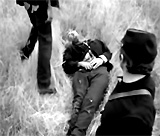
One of the Badly Dazed and Wounded - Jim's Death Scene
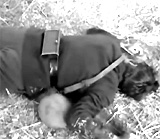
Henry's Own Wound - A 'Red Badge of Courage'
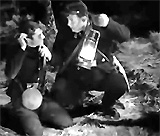
Henry Found in the Dark by the Cheery Soldier
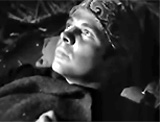
Narrator: "...he was still a man"
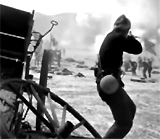
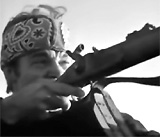
Henry Advancing Toward the Enemy by Himself
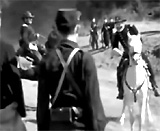
Three Times, The General Invited Himself For Dinner
After the Next Battle
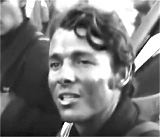
Henry's Final Words
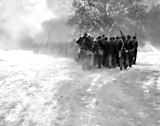
Marching Home
|



















